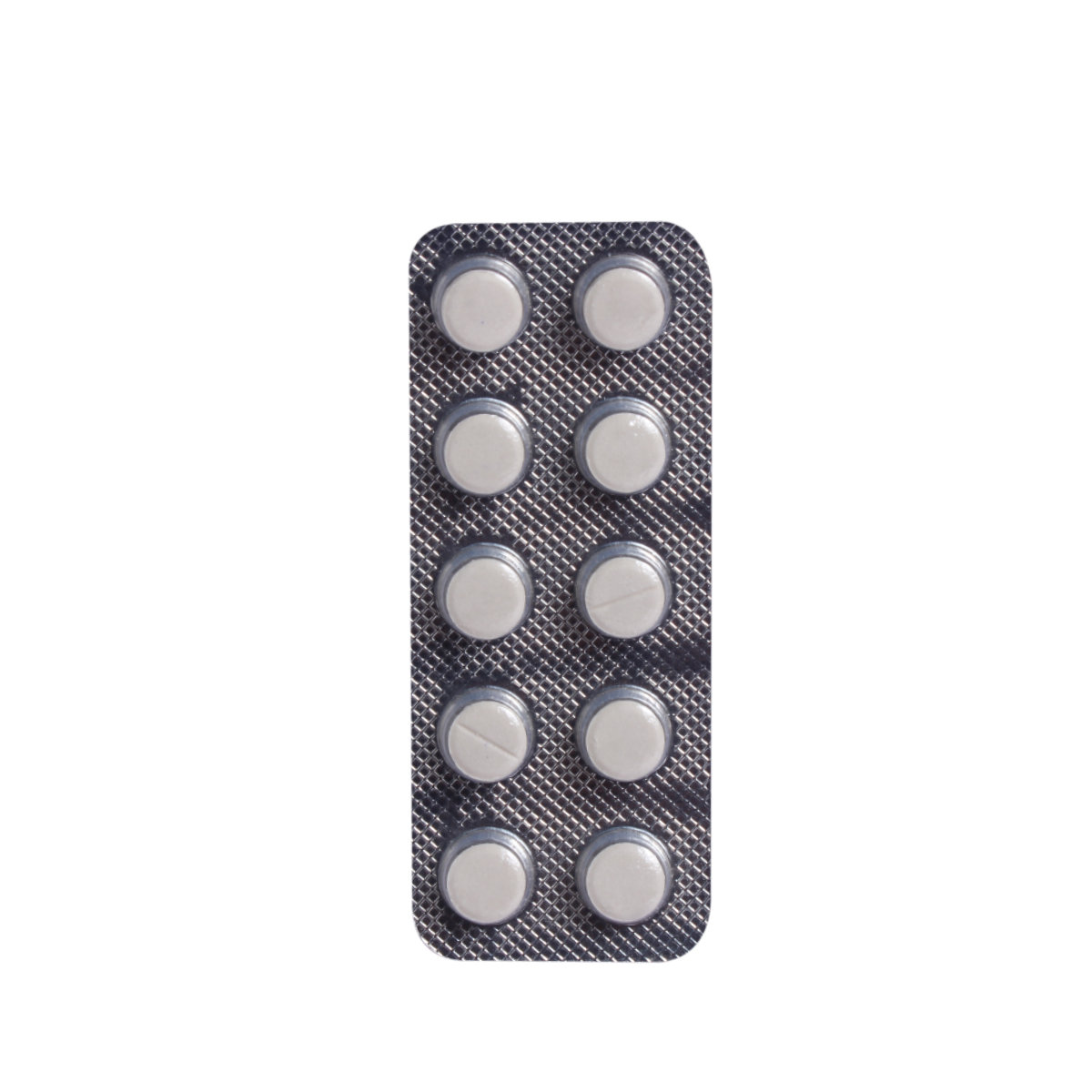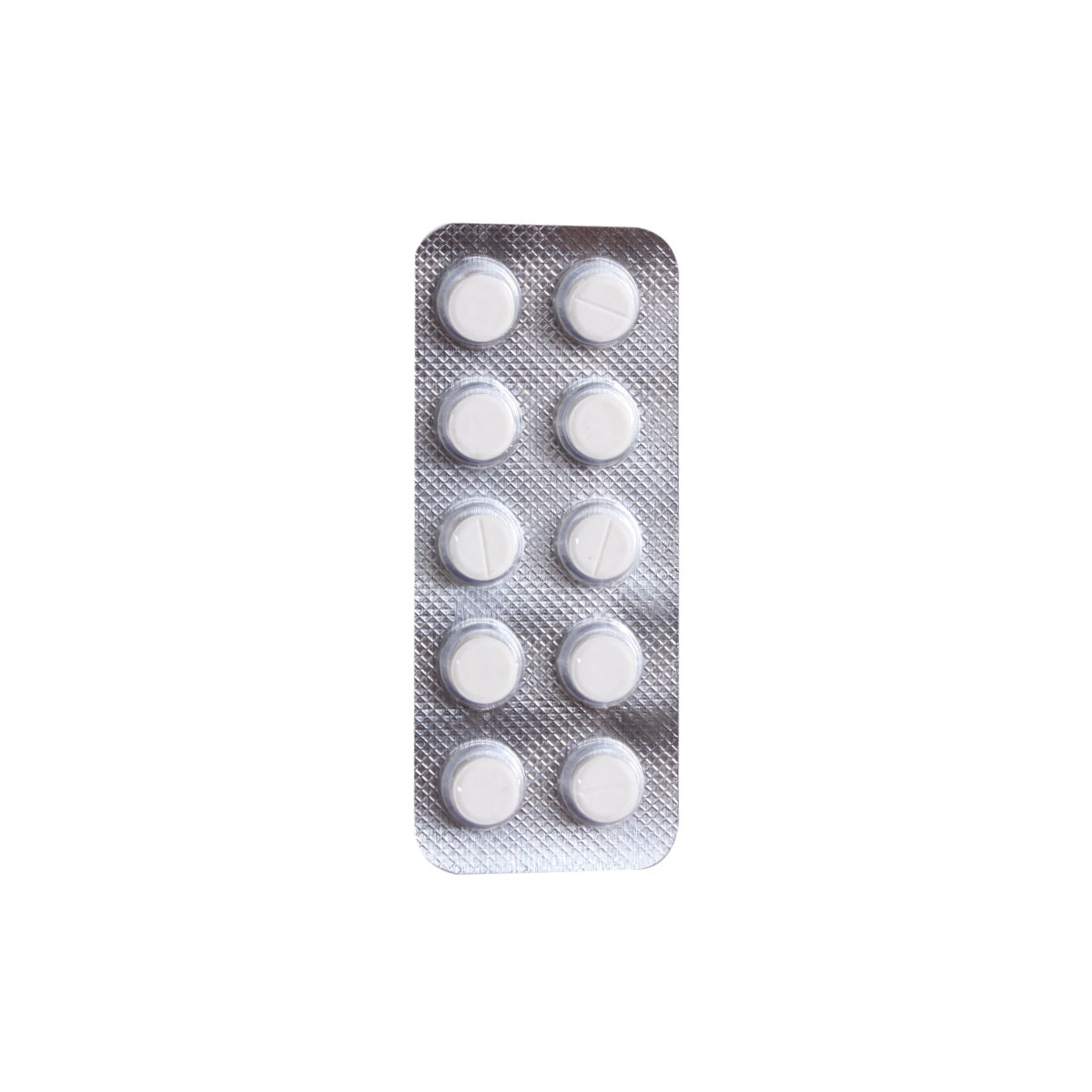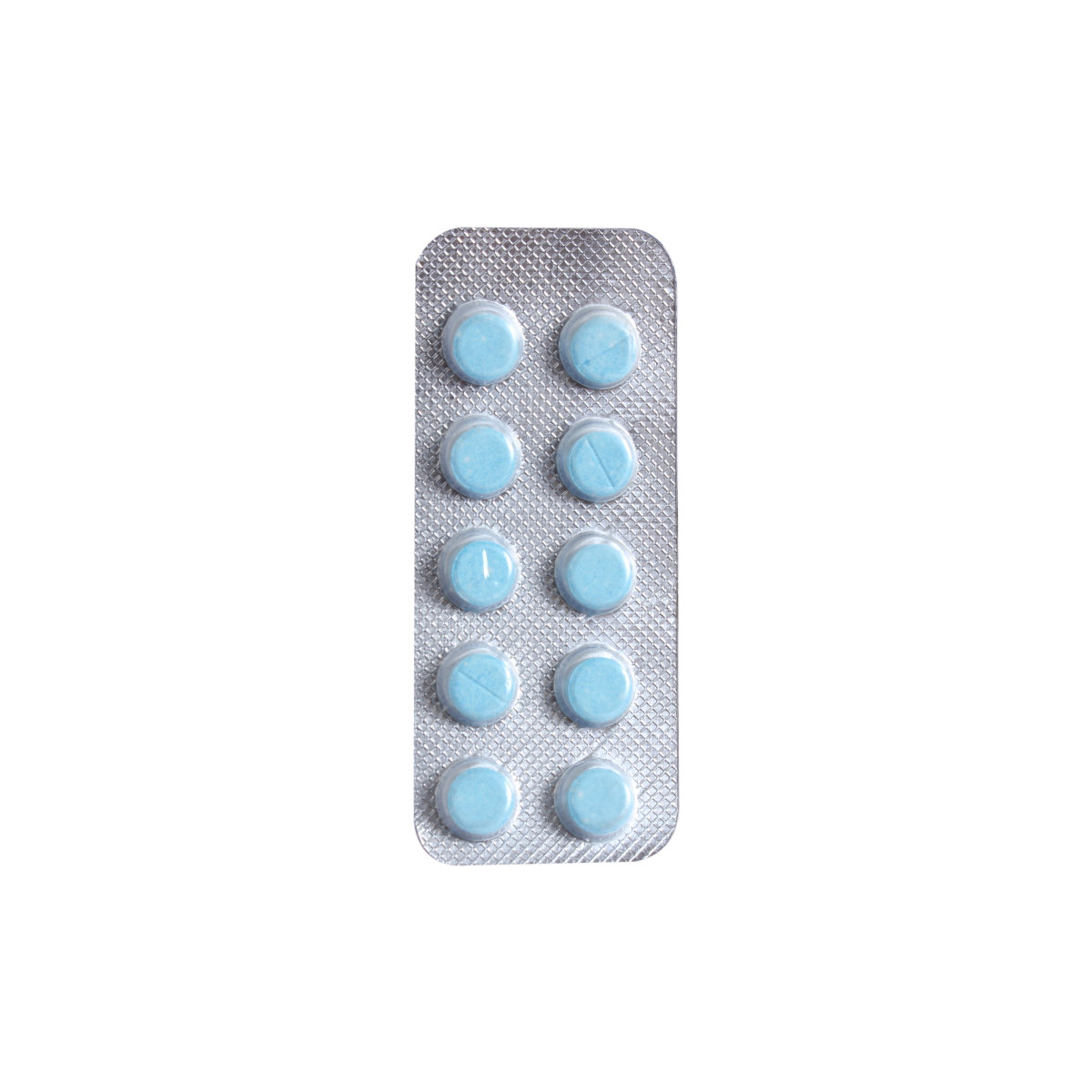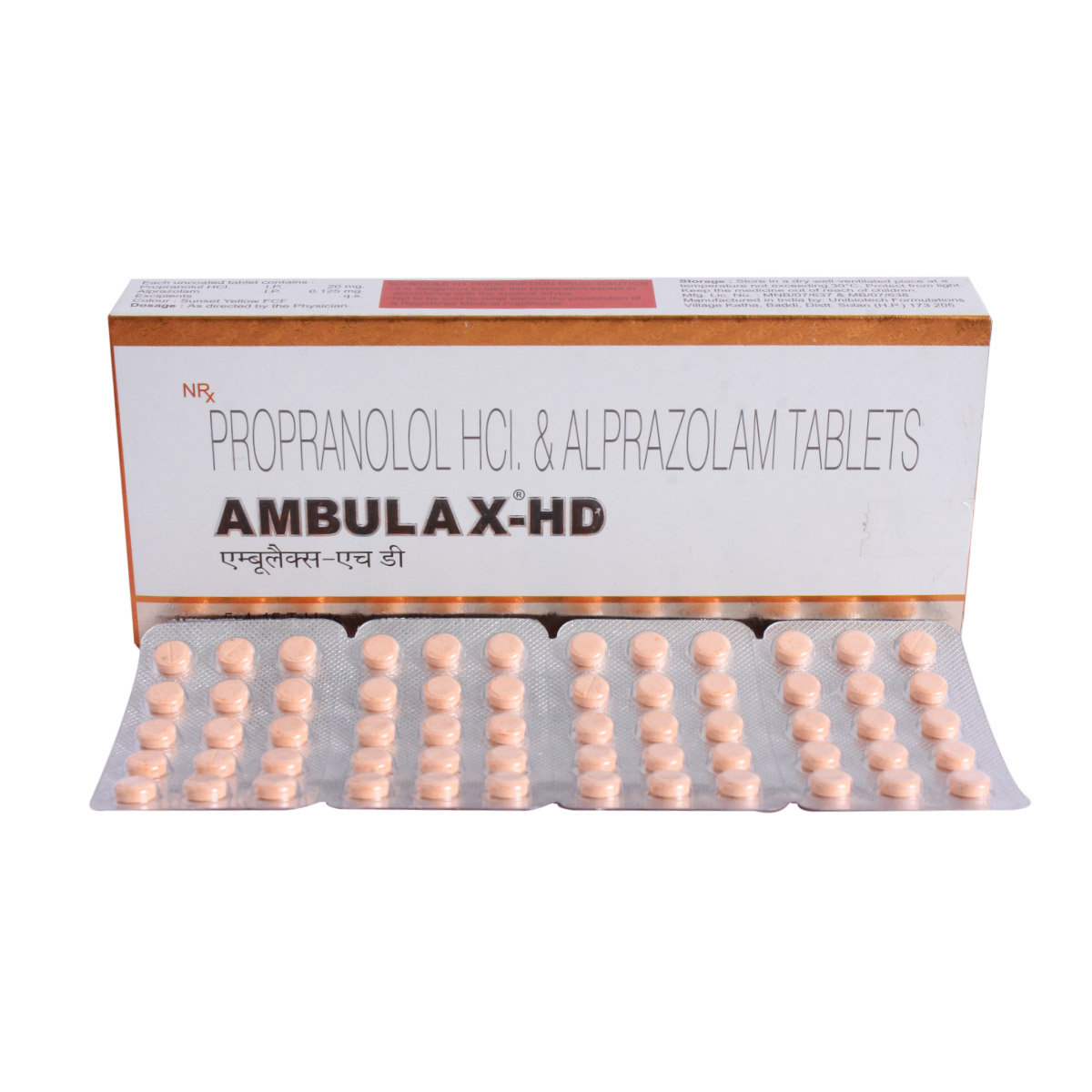Propranolol+alprazolam
About Propranolol+alprazolam
Propranolol+alprazolam belongs to the group of medicines called anxiolytics that is used to treat anxiety disorder. Anxiety disorder is a mental health disorder characterized by feelings of anxiety, worry or fear that are strong enough to interfere with one’s daily activities. Symptoms of anxiety include rapid breathing, increased heart rate, restlessness, trouble concentrating and difficulty falling asleep.
Propranolol+alprazolam is a combination of two drugs: Alprazolam (benzodiazepine) and Propranolol (beta-blocker). Alprazolam works by increasing the action of a chemical messenger called GABA, this helps suppress the nerve cell's excessive and abnormal activity in the brain. Propranolol blocks certain chemical messenger's action on the heart and blood vessels, reducing heart rate and blood pressure.
Take Propranolol+alprazolam as directed by your doctor. You are advised to take Propranolol+alprazolam for as long as your doctor has prescribed it for you depending on your medical condition. In some cases, you may experience certain common side effects such as confusion, drowsiness, memory impairment, uncoordinated body movements, nightmare, and cold extremities. You are advised to talk to your doctor if you experience these side effects persistently.
Please do not stop taking Propranolol+alprazolam on your own as it might cause withdrawal symptoms. Do not take Propranolol+alprazolam if you are pregnant or breastfeeding unless prescribed. Propranolol+alprazolam may cause dizziness and sleepiness, do not drive or handle machinery unless you are alert. Avoid consumption of alcohol, opioid medicine, or other drugs while taking Propranolol+alprazolam as it may cause increased dizziness or other fatal side effects. Propranolol+alprazolam is not recommended for children as safety and effectiveness were not established. Keep your doctor informed about all the medicines you are taking, including prescription, and non-prescription medications and herbal supplements. Propranolol+alprazolam contains Alprazolam, which may be habit-forming. Do not give it to others, and it should be used only by the person for whom it was prescribed. Please keep it in a secure place where others cannot have their hands on it. Misuse of Alprazolam can cause overdose, addiction or death. Inform your doctor if you have mood problems, liver or kidney disease, breathing problems, diabetes and low blood pressure.
Uses of Propranolol+alprazolam
Medicinal Benefits
Propranolol+alprazolam is a combination of two drugs, namely: Alprazolam and Propranolol. Propranolol+alprazolam is used to treat anxiety disorder. Alprazolam is a benzodiazepine that increases the action of a chemical messenger called GABA, this helps suppress the nerve cell's excessive and abnormal activity in the brain. Propranolol is a beta-blocker that blocks certain chemical messenger's action on the heart and blood vessels, reducing heart rate and blood pressure. Altogether, Propranolol+alprazolam is used to treat anxiety disorder.
Directions for Use
Storage
Side Effects of Propranolol+alprazolam
- Confusion
- Drowsiness
- Memory impairment
- Uncoordinated body movements
- Nightmare
- Cold extremities
- Dry mouth
- Depression
- Muscle weakness
Drug Warnings
Do not take Propranolol+alprazolam if you are allergic to any of its contents if you have breathing or lung problems, a serious heart condition such as 'sick sinus syndrome', severe liver problems, and myasthenia gravis (muscle problems). Inform your doctor before taking Propranolol+alprazolam if you have drug or alcohol addiction, depression, kidney/liver disease. Propranolol+alprazolam may be habit-forming, so inform your doctor if you have a history of drug addiction or abuse. Keep your doctor informed about all the medicines you are taking, including prescription, non-prescription medicines and herbal supplements. Please do not stop taking Propranolol+alprazolam on your own as it might cause withdrawal symptoms. Do not take Propranolol+alprazolam if you are pregnant or breastfeeding unless prescribed. Propranolol+alprazolam may cause dizziness and sleepiness, do not drive or handle machinery unless you are alert. Avoid alcohol consumption while taking Propranolol+alprazolam as it may cause increased dizziness or other fatal side effects. Propranolol+alprazolam is not recommended for children as safety and effectiveness were not established. Talk to your doctor immediately if you experience suicidal thoughts such as killing or harming yourself. Also, speak to your doctor immediately if you have slow or uneven heartbeats, severe skin reactions, breathing problems after taking Propranolol+alprazolam. Propranolol+alprazolam contains alprazolam, which should not be used if you have narrow-angle glaucoma. Also, do not take itraconazole or ketoconazole while you are Propranolol+alprazolam. Do not take Propranolol+alprazolam for more than 12 weeks, including a period where the dose is gradually reduced. Do not stop this medication on your own and speak with your doctor if you do not feel better or have any discomfort while taking it. Propranolol+alprazolam should be used with caution in elderly people, due to the risk of side effects.
Drug Interactions
Drug-Drug Interactions: Propranolol+alprazolam may have interaction with a blood thinner (warfarin, Coumadin), an antidepressant (amitriptyline, clomipramine, desipramine), medicines to treat high blood pressure or a prostate disorder (doxazosin, prazosin, terazosin), pain medication/NSAIDs (aspirin, ibuprofen, naproxen, celecoxib, diclofenac, indomethacin, meloxicam), oral contraceptives, medicines for treating fungal infections (e.g. ketoconazole), medicines used for treating HIV (ritonavir) and steroid medicine (prednisone).
Drug-Food Interactions: Avoid consumption of alcohol while taking Propranolol+alprazolam as it may cause increased drowsiness.
Drug-Disease Interactions: Propranolol+alprazolam may have interactions with breathing or lung problems, severe liver problems, myasthenia gravis (muscle problems), depression, heart problems and diabetes mellitus.
Drug-Drug Interactions Checker List:
Safety Advice

Alcohol
unsafeAvoid consumption of alcohol with Propranolol+alprazolam as it may result in fatal side effects.

Pregnancy
unsafePropranolol+alprazolam is unsafe for use during pregnancy. Please consult your doctor before taking Propranolol+alprazolam if you are pregnant, your doctor will prescribe Propranolol+alprazolam if the risks outweigh the benefits.

Breast Feeding
cautionLimited data suggest that Propranolol+alprazolam does not have any significant risk for the baby. However, please consult your doctor before taking Propranolol+alprazolam, your doctor will decide whether Propranolol+alprazolam can be taken by breastfeeding mothers or not.

Driving
unsafePropranolol+alprazolam may cause dizziness and sleepiness. Do not drive or handle machinery unless you are alert.

Liver
cautionPropranolol+alprazolam should be used in caution in patients with liver problems. Dose adjustment may be needed. Please consult your doctor before taking Propranolol+alprazolam if you have a liver impairment or any concerns regarding this.

Kidney
cautionPropranolol+alprazolam should be used in caution in patients with kidney problems. Dose adjustment may be needed. Please consult your doctor before taking Propranolol+alprazolam if you have a kidney impairment or any concerns regarding this.

Children
unsafePropranolol+alprazolam is not recommended for children as the safety and effectiveness were not established.
Habit Forming
Diet & Lifestyle Advise
- Attend therapy sessions regularly.
- Eat a healthy diet.
- Try to stay active and exercise regularly.
- Take ample rest. Get enough sleep.
- Meditate regularly as it helps in easing anxiety.
- Avoid smoking, caffeine and alcohol consumption.
- Foods and drinks like salmon, chamomile, turmeric, dark chocolate, green tea and yogurt may help with anxiety.
Special Advise
- Propranolol+alprazolam might cause suicidal thoughts. Consult your doctor immediately if you experience unusual mood changes, depression or suicidal thoughts such as killing or harming yourself.
- Regularly monitor your blood pressure levels while taking Propranolol+alprazolam.
Patients Concern
Disease/Condition Glossary
Anxiety disorder: It is a mental health disorder characterized by feelings of anxiety, worry or fear that are strong enough to interfere with one’s daily activities. Anxiety is the body’s natural response to stress in which the feeling of fear may be intense and debilitating. It is the most common form of emotional disorder and can affect anyone, at any age. The exact cause of anxiety is unknown, but it might be due to genetic or environmental factors. Symptoms of anxiety include rapid breathing, increased heart rate, restlessness, trouble concentrating and difficulty falling asleep.
FAQs
Propranolol+alprazolam is a combination of two drugs, namely: Alprazolam and Propranolol. Alprazolam works by increasing the action of a chemical messenger called GABA, this helps suppress the nerve cell's excessive and abnormal activity in the brain. Propranolol blocks certain chemical messenger's action on the heart and blood vessels, reducing heart rate and blood pressure.
Do not stop taking Propranolol+alprazolam on your own as it might increase the seizure frequency, chest pain and heart attack. Stopping it suddenly may cause withdrawal symptoms such as nausea, anxiety, muscle pain, and flu-like symptoms. Consult your doctor if you experience any difficulty while taking Propranolol+alprazolam, the doctor may gradually reduce the dose.
Dry mouth could be a side-effect of Propranolol+alprazolam. Limiting caffeine intake, avoiding smoking and mouthwashes containing alcohol, drinking water regularly and chewing sugar-free gum/candy might stimulate saliva and prevent drying of the mouth.
Propranolol+alprazolam has high habit-forming potential. Therefore, take Propranolol+alprazolam only in the dose and duration as prescribed by the doctor.
Propranolol+alprazolam might cause weight gain or weight loss depending from person to person. Eat a balanced diet and exercise regularly to prevent weight gain if you experience weight loss and increase your diet's food portions.








